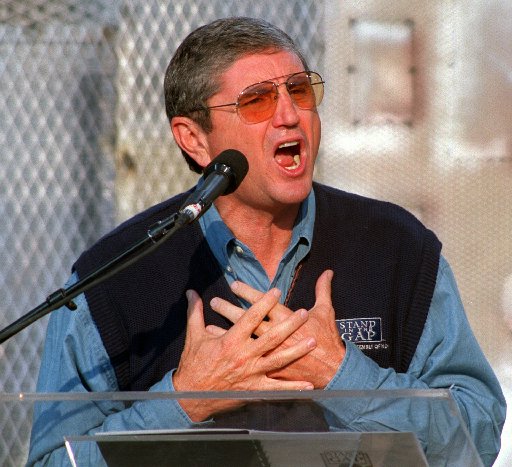Lifestyle
University of Colorado Faces Calls for Inclusivity Amid Coach Statue Debate

The University of Colorado is currently navigating a complex discussion regarding the placement of a statue honoring Coach Bill McCartney, following recent reflections on the institution’s commitment to inclusivity. Jean Hodges, a long-time supporter of the university, emphasizes the need for contextualizing McCartney’s legacy, particularly in light of his public displays of homophobia in the 1990s.
Hodges expressed her concerns in a letter, highlighting the painful history associated with McCartney’s actions during the Promise Keepers event, where he led a crowd in anti-LGBTQ+ sentiments. This moment, she argues, should not be overlooked when considering the statue’s placement on campus. “Placing the new statue in a prominent place on campus without regard for the full history elevates a successful coach but denies the hurtful effects that deserve to be redeemed by positive action,” she wrote.
The debate comes in the wake of McCartney’s death, which has prompted discussions on how best to honor his contributions while also recognizing the struggles for inclusion faced by many within the university community. Hodges noted that the university’s student body leaders, along with faculty and staff, have called for a re-evaluation of the statue’s location to ensure it aligns with the university’s core values of respect and inclusivity.
Hodges’ family has a long history with the university, dating back to 1960 when her husband joined the Mathematics faculty. Their pride in the university was significantly impacted by McCartney’s actions during his tenure, particularly when their son, a 1988 alumnus, was openly gay. This personal connection adds a layer of depth to Hodges’ advocacy for a more inclusive representation of history on campus.
In her letter, Hodges applauded the student leadership’s initiative to propose compromises that honor McCartney while also reaffirming the university’s dedication to diversity and inclusion. She urged Chancellor Justin Schwartz to consider placing a historic plaque alongside the statue, which would provide context and facilitate ongoing conversations about inclusivity at the university.
The conversation around the statue is not only about honoring a sports figure but also about acknowledging the university’s past and working towards a future where all individuals feel valued. Hodges concluded her letter with a hopeful note, expressing that through these efforts, the university community could unite under the rallying cry of “Go Buffs!” with renewed pride.
In a separate discourse, Dean Garyet also contributed to the discussion by advocating for the need to cap private jet flights in the U.S. to alleviate pressures on air traffic controllers and reduce carbon emissions. He highlighted that while there are approximately 45,000 commercial flights daily, carrying around 2.34 million passengers, private jets represent a much smaller number of flights—between 10,000 and 15,000—carrying only about 12,000 to 15,000 passengers.
Garyet suggested that limiting private flights could be an effective measure for enhancing air traffic management while addressing environmental concerns. He pointed out that this approach could serve as a litmus test for the U.S. commitment to equity and social responsibility, contrasting the needs of the broader population with the privileges of the economic elite.
The discussions at the University of Colorado and on air traffic policies reflect broader societal challenges regarding inclusivity and environmental responsibility. As these dialogues evolve, they underscore the importance of balancing historical recognition with contemporary values in shaping a more equitable future.
-

 Science4 weeks ago
Science4 weeks agoIROS 2025 to Showcase Cutting-Edge Robotics Innovations in China
-

 Lifestyle4 weeks ago
Lifestyle4 weeks agoStone Island’s Logo Worn by Extremists Sparks Brand Dilemma
-

 Health4 weeks ago
Health4 weeks agoStartup Liberate Bio Secures $31 Million for Next-Gen Therapies
-

 World4 weeks ago
World4 weeks agoBravo Company Veterans Honored with Bronze Medals After 56 Years
-

 Politics4 weeks ago
Politics4 weeks agoJudge Considers Dismissal of Chelsea Housing Case Citing AI Flaws
-

 Health4 weeks ago
Health4 weeks agoTop Hyaluronic Acid Serums for Radiant Skin in 2025
-

 Lifestyle4 weeks ago
Lifestyle4 weeks agoMary Morgan Jackson Crowned Little Miss National Peanut Festival 2025
-

 Science4 weeks ago
Science4 weeks agoArizona State University Transforms Programming Education Approach
-

 World4 weeks ago
World4 weeks agoHoneywell Predicts Record Demand for Business Jets Over Next Decade
-

 Sports4 weeks ago
Sports4 weeks agoYamamoto’s Mastery Leads Dodgers to 5-1 Victory in NLCS Game 2
-

 Top Stories4 weeks ago
Top Stories4 weeks agoIndonesia Suspends 27,000 Bank Accounts in Online Gambling Crackdown
-

 Sports4 weeks ago
Sports4 weeks agoMel Kiper Jr. Reveals Top 25 Prospects for 2026 NFL Draft









